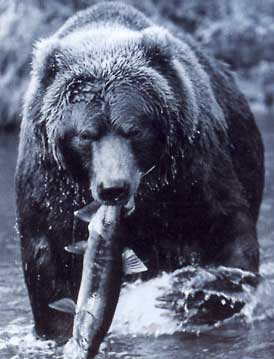
(image via wildlife-conservation)
The land of Tolstoy and Tchaikovsky is, to be sure, more West than East. Longtime readers of this blog know well our alarm over the Bush Administration's handling of Russo-American relations. We expected an old Russia hand like Condi Rice to exert a moderating influence on the silver-haired Cold Warriors at Defense reveling in rubbing the now-vulnerable Russian Bear's face in the fetid mud of the river Volga. (The haunting, melancholy sound of an antique 19th Century Swiss music box) Perestoika dismantled the former Soviet Union with astonishing velocity. Even Gorbachev couldn't have predicted the centripetal forces of History. The paranoiac KGB was, no doubt, gigantically vulnerable. And .. we kept our cowboy boots at the supine neck of the Russian Bear. Sweet.
An opportunity to bring Russia to the West has been lost for at least a few generations.
Two noteworthy essays -- one by Steven Cohen in The Nation, and another by Dmitri tenin in Foreign Affairs -- read side by side (one Progressive, one Right-of-Center) bring out the bitterness of the tragedy.
From Tenin:
"The Kremlin's new approach to foreign policy assumes that as a big country, Russia is essentially friendless; no great power wants a strong Russia, which would be a formidable competitor, and many want a weak Russia that they could exploit and manipulate. Accordingly, Russia has a choice between accepting subservience and reasserting its status as a great power, thereby claiming its rightful place in the world alongside the United States and China rather than settling for the company of Brazil and India.
"The United States and Europe can protest this change in Russia's foreign policy all they want, but it will not make any difference."
Now, Cohen:
"Petrodollars may bring Russia long-term stability, but on the basis of growing authoritarianism and xenophobic nationalism. Those ominous factors derive primarily not from Russia's lost superpower status (or Putin's KGB background), as the US press regularly misinforms readers, but from so many lost and damaged lives at home since 1991. Often called the "Weimar scenario," this outcome probably would not be truly fascist, but it would be a Russia possessing weapons of mass destruction and large proportions of the world's oil and natural gas, even more hostile to the West than was its Soviet predecessor.
"How has the US government responded to these unprecedented perils? It doesn't require a degree in international relations or media punditry to understand that the first principle of policy toward post-Communist Russia must follow the Hippocratic injunction: Do no harm! Do nothing to undermine its fragile stability, nothing to dissuade the Kremlin from giving first priority to repairing the nation's crumbling infrastructures, nothing to cause it to rely more heavily on its stockpiles of superpower weapons instead of reducing them, nothing to make Moscow uncooperative with the West in those joint pursuits. Everything else in that savaged country is of far less consequence.
"Since the early 1990s Washington has simultaneously conducted, under Democrats and Republicans, two fundamentally different policies toward post-Soviet Russia--one decorative and outwardly reassuring, the other real and exceedingly reckless."
Alas.
No comments:
Post a Comment